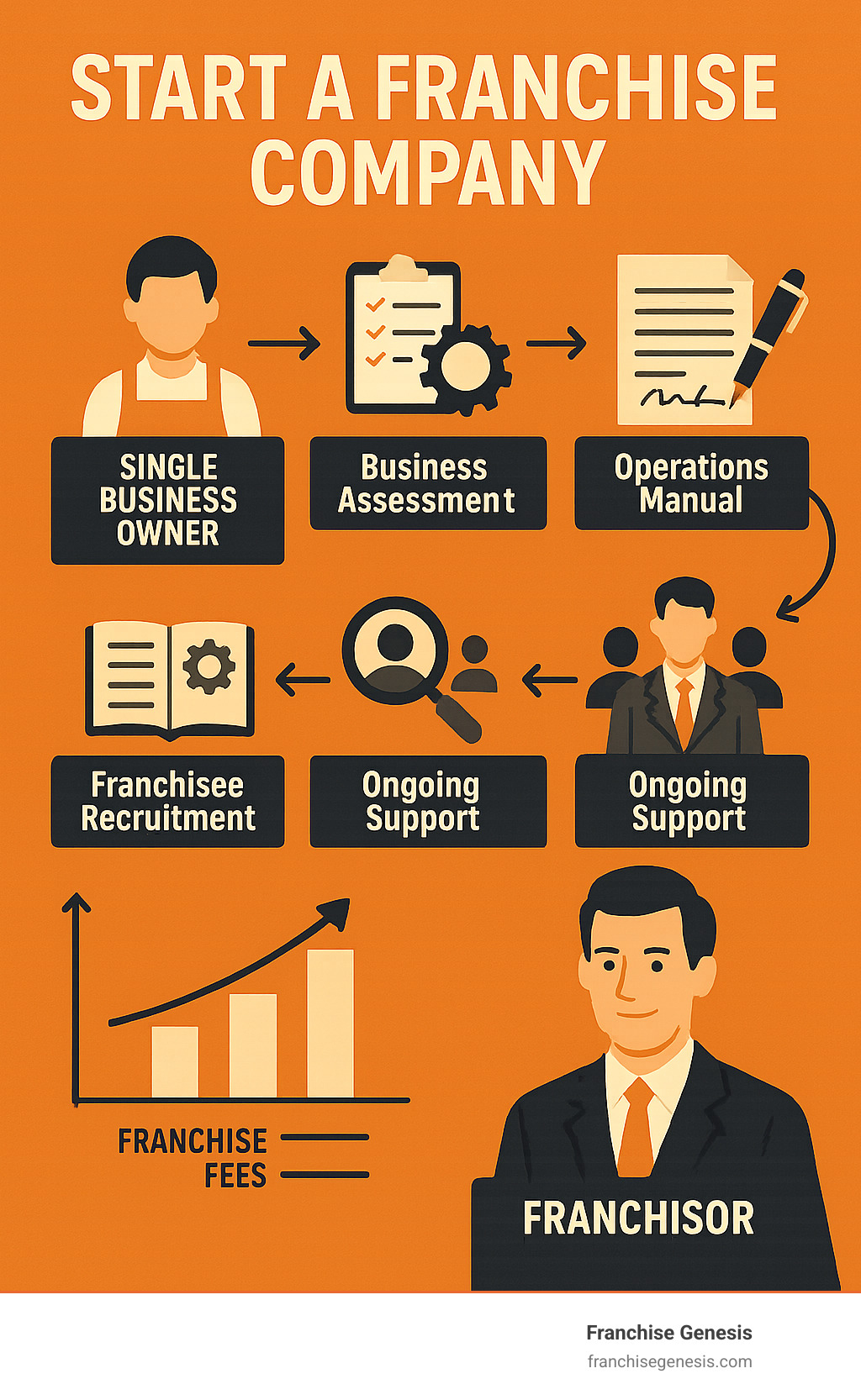Why Starting a Franchise Company is the Ultimate Growth Strategy
To start a franchise company is to transform your successful business into a scalable model that generates revenue through franchise fees, royalties, and brand expansion. It allows for faster growth than organic expansion by leveraging franchisees’ capital and entrepreneurial drive.
Here’s what you need to start a franchise company:
- Business Assessment: A profitable, replicable business with a strong brand.
- Legal Framework: A Franchise Disclosure Document (FDD) and franchise agreements.
- Operations Manual: Documented procedures and training programs.
- Fee Structure: Initial franchise fees ($5,000-$75,000) and ongoing royalties.
- Support System: Comprehensive training, marketing, and franchisee assistance.
- Marketing Strategy: A plan to attract qualified franchise candidates.
- Expert Team: A franchise attorney, consultant, and specialized advisors.
However, not every business is franchisable. Your concept needs proven financial performance, standardized operations, and a unique selling proposition. The process typically costs $50,000-$150,000 and takes 90-120 days with expert guidance. The rewards are substantial, with franchising being a major economic driver and a proven model for scalability.
I’m Monique Pelle-Kunkle, Vice President of Operations at Franchise Genesis. I’ve helped countless business owners start a franchise company, including scaling one ABA therapy franchise to over 100 locations in its first year. This guide shares the insights needed to replicate that kind of success.

Is Your Business Ready for Franchising? The Foundational Assessment
Before you can grow your successful business into a franchise, you must ask: “Is my business truly ready?” Franchising requires a strong foundation, a replicable model, and a shift in your role from operator to mentor. It’s about building a system that allows others to replicate your success, moving from a people-dependent model to a systems-based one.
We assess a business’s franchisability by focusing on these key areas:
- Replicable business model: Can your success be duplicated by others?
- Strong financial performance: Is your business consistently profitable?
- Scalability: Can your concept thrive in different markets?
- Brand strength: Do you have a recognizable and appealing brand?
- Standardized operations: Are your processes documented and easily teachable?
- Owner’s personality shift: Are you ready to become a coach and mentor?
Evaluating Your Business Model’s Franchisability
To start a franchise company, your business model must be attractive and feasible for replication. This starts with a proven concept—a business with a track record of consistent profitability and customer demand. Potential franchisees need to see sustained financial performance.
Next, your Unique Selling Proposition (USP) must be strong. What makes your business stand out? This competitive edge needs to attract both customers and franchisees. Critically, you need codified systems. Your methods and procedures must be standardized and teachable, ensuring brand consistency across all locations, much like how major fast-food chains operate.
Finally, consider the ease of training and supply chain management. An overly complex business is difficult to teach, and a reliable supply chain is essential for maintaining quality and cost-effectiveness across the network.
Assessing Your Personal and Financial Readiness
Your personal readiness is as important as your business model. Financially, you need the capital for setup costs, which typically range from $50,000 to $150,000 for legal fees, consulting, and marketing development.
More importantly, you must be ready for a shift in mindset. You will transition from a hands-on operator to a coach and strategic leader for a network of business owners. This requires strong leadership skills and an unwavering commitment to supporting franchisees. This is a long-term relationship built on mutual success.
Finally, a clear long-term vision for your franchise empire is essential. This vision will guide your strategy, attract the right partners, and sustain you through the challenges of growth. Being a franchisor means focusing on building a successful ecosystem, not just a single business.
The Legal and Financial Blueprint to Start a Franchise Company
Once you’ve determined your business is ready, the next step is building the legal and financial groundwork. This phase is complex but essential for creating a stable franchise empire. When you start a franchise company, you enter a regulated industry where transparency is mandated by the Federal Trade Commission (FTC), which helps build trust with potential franchisees.

Your legal blueprint centers on two key documents: the Franchise Disclosure Document (FDD) and the Franchise Agreement. These define the franchise relationship. You must also protect your intellectual property, establish the right business structure, and design a sustainable fee system.
Navigating the Legal Maze: FDD and Agreements
The Franchise Disclosure Document (FDD) is a comprehensive overview of your business, mandated by federal law. It must be given to prospects at least 14 days before any contract is signed or money is paid. The FDD includes your company’s history, management bios, financial statements, franchisee contacts, territory rights, and a full breakdown of costs. This transparency builds trust and attracts serious candidates.
The Franchise Agreement is the legally binding contract that governs your relationship with each franchisee. It details territory boundaries, operational standards, training, support, marketing contributions, and renewal terms. Every detail is critical for the long-term health of the relationship.
Additionally, some states have state registration requirements, meaning you must register your offering before selling franchises there. Protecting your brand through trademarks and other legal safeguards is also vital to prevent competitors or former franchisees from misusing your valuable intellectual property.
Franchise Registration States Guide
Calculating the Costs and Structuring Your Fees
The upfront investment to start a franchise company typically ranges from $50,000 to $150,000. This covers legal fees for your FDD and agreement, operations manual development, and marketing materials. While significant, this investment creates a system for long-term revenue.
As a franchisor, your revenue will come from several streams:
- Initial Franchise Fee: A one-time payment from new franchisees, typically $5,000 to $75,000, covering your costs for recruitment, training, and launch support.
- Ongoing Royalties: Recurring payments, usually 5-10% of gross sales, that compensate you for the ongoing use of your brand, support, and system improvements.
- Advertising Fund Contributions: Typically 1-3% of gross sales, these fees are pooled for large-scale marketing campaigns that benefit the entire system.
You may also generate revenue from vendor rebates or sales of proprietary products. The key is to structure fees so that both you and your franchisees can prosper. Your system’s survival depends on your franchisees’ profitability.
The Cost to Start a Franchise and Financing Options
Building Your Franchise System: Operations and Support
With the legal and financial groundwork laid, it’s time to build the operational heart of your franchise. This is where you translate your proven business model into a replicable, teachable system that enables others to succeed. When you start a franchise company, you are creating a complete system, not just selling a business opportunity.

This system is built on several key pillars:
- A comprehensive Operations Manual (the franchisee’s “bible”).
- Robust training programs to bring procedures to life.
- Site selection support to help franchisees find winning locations.
- Clear marketing guidelines to ensure brand consistency.
- An ongoing support structure to keep franchisees thriving.
- A modern technology stack to streamline operations.
This framework ensures your franchisees have a roadmap to success, which in turn fuels the growth of your entire empire.
Creating a World-Class Franchisee Training and Support Program
Your success as a franchisor depends on your franchisees’ success, making an exceptional training and support program critical. Your initial training curriculum must be thorough, covering everything from daily operations to marketing and financial management. This is often an intensive program held at your headquarters or on-site.
Training continues with on-site launch support during the crucial opening weeks. This helps build franchisee confidence and ensures a smooth start. The real value, however, comes from ongoing coaching and regular field support. These scheduled check-ins and site visits are collaborative sessions focused on problem-solving and growth.
Annual conventions and regional meetings foster a sense of community, allowing franchisees to learn from each other and enabling you to roll out system-wide updates. Finally, establish clear communication channels—like an online portal, newsletters, or direct phone lines—so franchisees can always get the help they need.
The Franchise Operations Manual: Your Business Bible
The Franchise Operations Manual is the comprehensive textbook that franchisees will reference long after initial training. It must carefully document procedures for every aspect of the business, from opening to closing.
Key components of the manual include:
- Brand Standards: This covers everything from visual elements like signage and uniforms to the tone of customer communications. These standards ensure a consistent customer experience across all locations.
- Customer Service Protocols: Guidelines on how to deliver the high-quality service that builds brand loyalty.
- Financial Reporting: Clear instructions on what data to track, how to calculate key metrics, and when to submit reports. This helps you monitor the health of the network.
- Daily Operations Checklists: Step-by-step lists that simplify complex processes, reduce errors, and improve efficiency.
A well-crafted Operations Manual is the trusted guide that empowers franchisees to run their business effectively and consistently.
Selling Your Franchise: Marketing, Sales, and Growth
With your business model, legal framework, and support system in place, it’s time to find the right people to join your franchise family. This stage is about connecting with passionate entrepreneurs who share your vision and are a perfect fit for your brand.
We help you define your ideal franchisee profile and guide you through a sales process that builds trust. A key event is “Findy Day,” where prospects visit your headquarters for an inside look at your operations. You aren’t just selling franchises; you are awarding franchises to partners who will help your brand thrive. Quality over quantity is the key to long-term success.
Understanding the Key to Building a Thriving Franchise Network
How to Start a Franchise Company by Attracting the Right Partners
When you start a franchise company, your marketing should cast a smart net, not a wide one. The goal is to attract candidates who are a great fit for your specific business model.
Start by developing marketing materials that authentically tell your brand’s story and showcase the opportunity. Your digital marketing strategy should focus on reaching prospects where they are, using website optimization and targeted social media like LinkedIn. Franchise portals are also valuable, as they attract people actively researching opportunities.
Don’t overlook public relations in business journals or industry publications to build credibility. The foundation for all this is your franchisee avatar—a detailed profile of your ideal partner. Knowing who you’re looking for makes every marketing effort more effective.
The Franchise Sales Process: From Lead to Launch
The franchise sales process is a multi-step journey designed to ensure a mutual fit. It’s more of a courtship than a hard sell.
- Initial Qualification Call: A conversation to determine mutual interest and basic compatibility.
- Application Review: A comprehensive application provides insight into the candidate’s background, finances, and motivations.
- FDD Disclosure: A critical legal step where you provide the Franchise Disclosure Document. This allows serious candidates to perform their due diligence.
- Findy Day: An invitation-only event at your headquarters for qualified prospects to meet your team and see your operations firsthand. It’s a key moment for assessing cultural fit.
- Final Approval: Your decision to award the franchise to the candidate.
- Signing the Agreement: The official start of your long-term business partnership.
This structured process ensures you choose the right long-term partners for your brand.
Transform Leads into Loyal Franchisees with a Proven Sales Strategy
Assembling Your A-Team: The Experts You Need
When you start a franchise company, you are undertaking a complex business venture. Attempting it without specialized experts is a significant risk. Franchising has unique legal, financial, and operational standards that require a team of professionals with specific industry experience.
Assembling the right team is essential for avoiding costly mistakes and building a system that can scale successfully. Your A-team should include:
-
A Franchise Consultant: Your strategic quarterback. A consultant helps assess your franchisability, develop your business model, structure fees, and steer the common pitfalls new franchisors face. Their experience is invaluable in shaping a competitive and sustainable franchise offering.
-
A Specialized Franchise Attorney: General business lawyers are not equipped for franchising’s specific legal landscape. A franchise attorney is crucial for drafting a compliant Franchise Disclosure Document (FDD) and a bulletproof Franchise Agreement. They protect your brand, trademarks, and business systems while ensuring you meet all federal and state regulations.
-
An Accountant with Franchising Experience: This expert understands the unique financial dynamics of franchising. They help structure fees and royalties, create financial forecasts for your role as a franchisor, and set up the reporting systems needed to monitor your network’s health.
-
A Banker Who Understands Franchising: A banker familiar with the franchise model is a valuable resource for your own capital needs and can also help your future franchisees secure financing, streamlining the lending process for qualified candidates.
The importance of specialized experience cannot be overstated. This team’s expertise is a foundational investment. The cost of fixing mistakes after launch is exponentially higher than the cost of getting it right from the start.
From Business to Franchise Conversion
Frequently Asked Questions about Franchising Your Business
Many business owners considering franchising have similar questions. Here are concise answers to the most common ones we hear at Franchise Genesis.
How much does it cost to franchise my business?
The typical investment to start a franchise company ranges from $50,000 to $150,000. This covers essential one-time costs, including:
- Legal Fees: For drafting your Franchise Disclosure Document (FDD) and Franchise Agreement.
- Consulting Fees: For strategic guidance on your franchise model and structure.
- Operations Manual Development: For codifying your business systems.
- Marketing Materials: For creating the professional assets needed to attract franchisees.
This upfront investment builds the system that generates long-term revenue through fees and royalties.
How to Make My Business a Franchise
How long does it take to franchise a business?
With a committed team and a well-prepared business, the process typically takes 90 to 120 days. The timeline depends on how well-documented your operational systems already are. During this period, your team will work simultaneously on strategic planning, legal documentation, and operations manual creation. Your responsiveness is key to keeping the process moving efficiently, allowing you to begin selling franchises sooner.
What is the biggest risk when I start a franchise company?
The single biggest risk is choosing the wrong franchisees. Awarding a franchise to someone who doesn’t share your values or lacks commitment can damage your entire brand. A bad customer experience at one location reflects on the whole system. This can lead to other major risks, such as litigation from disgruntled franchisees and a decline in brand reputation.
Another significant risk is failing to provide proper support. Franchisees rely on your training, marketing, and operational guidance. If you don’t deliver on your promises, you set them—and your brand—up for failure. These risks are manageable through a thorough vetting process, clear communication, and a robust, consistent support system.
Conclusion
The journey to start a franchise company is an opportunity to multiply the success you’ve already built. It allows you to take your proven systems, brand, and passion and expand them across new markets by empowering other entrepreneurs.
This guide has walked you through the critical steps: assessing your readiness, building the legal and financial blueprint, creating your operational and support systems, and finding the right partners to grow with. This process transforms your single business into a scalable, teachable model.
Franchising is more than a growth strategy; it’s a way to create a lasting legacy. It generates economic opportunity and allows others to achieve their entrepreneurial dreams on the foundation you’ve established. At Franchise Genesis, we’ve guided countless owners through this change, watching them build thriving networks from a single successful location.
The path requires vision and commitment, but the rewards are immense. Your business model works. Your customers are loyal. Now is the time to share that success and build an empire.
Ready to transform your success story into a network of thriving locations? We’re here to guide you through every step of the process.

